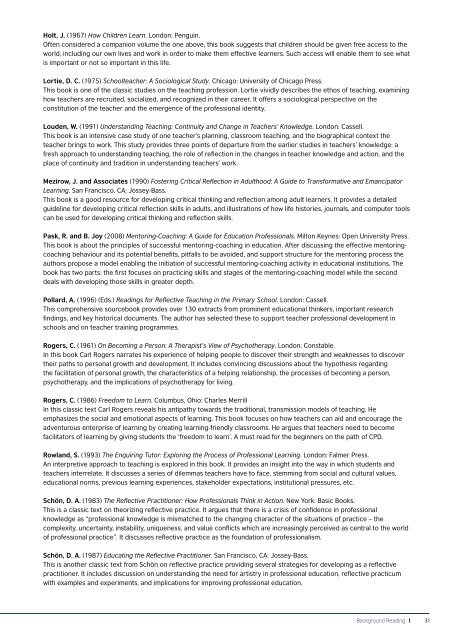Continuing Professional Development An ... - EnglishAgenda
Continuing Professional Development An ... - EnglishAgenda
Continuing Professional Development An ... - EnglishAgenda
You also want an ePaper? Increase the reach of your titles
YUMPU automatically turns print PDFs into web optimized ePapers that Google loves.
Holt, J. (1967) How Children Learn. London: Penguin.<br />
Often considered a companion volume the one above, this book suggests that children should be given free access to the<br />
world, including our own lives and work in order to make them effective learners. Such access will enable them to see what<br />
is important or not so important in this life.<br />
Lortie, D. C. (1975) Schoolteacher: A Sociological Study. Chicago: University of Chicago Press.<br />
This book is one of the classic studies on the teaching profession. Lortie vividly describes the ethos of teaching, examining<br />
how teachers are recruited, socialized, and recognized in their career. It offers a sociological perspective on the<br />
constitution of the teacher and the emergence of the professional identity.<br />
Louden, W. (1991) Understanding Teaching: Continuity and Change in Teachers’ Knowledge. London: Cassell.<br />
This book is an intensive case study of one teacher’s planning, classroom teaching, and the biographical context the<br />
teacher brings to work. This study provides three points of departure from the earlier studies in teachers’ knowledge: a<br />
fresh approach to understanding teaching, the role of reflection in the changes in teacher knowledge and action, and the<br />
place of continuity and tradition in understanding teachers’ work.<br />
Mezirow, J. and Associates (1990) Fostering Critical Reflection in Adulthood: A Guide to Transformative and Emancipator<br />
Learning. San Francisco, CA: Jossey-Bass.<br />
This book is a good resource for developing critical thinking and reflection among adult learners. It provides a detailed<br />
guideline for developing critical reflection skills in adults, and illustrations of how life histories, journals, and computer tools<br />
can be used for developing critical thinking and reflection skills.<br />
Pask, R. and B. Joy (2008) Mentoring-Coaching: A Guide for Education <strong>Professional</strong>s. Milton Keynes: Open University Press.<br />
This book is about the principles of successful mentoring-coaching in education. After discussing the effective mentoringcoaching<br />
behaviour and its potential benefits, pitfalls to be avoided, and support structure for the mentoring process the<br />
authors propose a model enabling the initiation of successful mentoring-coaching activity in educational institutions. The<br />
book has two parts: the first focuses on practicing skills and stages of the mentoring-coaching model while the second<br />
deals with developing those skills in greater depth.<br />
Pollard, A. (1996) (Eds.) Readings for Reflective Teaching in the Primary School. London: Cassell.<br />
This comprehensive sourcebook provides over 130 extracts from prominent educational thinkers, important research<br />
findings, and key historical documents. The author has selected these to support teacher professional development in<br />
schools and on teacher training programmes.<br />
Rogers, C. (1961) On Becoming a Person: A Therapist’s View of Psychotherapy. London: Constable.<br />
In this book Carl Rogers narrates his experience of helping people to discover their strength and weaknesses to discover<br />
their paths to personal growth and development. It includes convincing discussions about the hypothesis regarding<br />
the facilitation of personal growth, the characteristics of a helping relationship, the processes of becoming a person,<br />
psychotherapy, and the implications of psychotherapy for living.<br />
Rogers, C. (1986) Freedom to Learn. Columbus, Ohio: Charles Merrill<br />
In this classic text Carl Rogers reveals his antipathy towards the traditional, transmission models of teaching. He<br />
emphasizes the social and emotional aspects of learning. This book focuses on how teachers can aid and encourage the<br />
adventurous enterprise of learning by creating learning-friendly classrooms. He argues that teachers need to become<br />
facilitators of learning by giving students the ‘freedom to learn’. A must read for the beginners on the path of CPD.<br />
Rowland, S. (1993) The Enquiring Tutor: Exploring the Process of <strong>Professional</strong> Learning. London: Falmer Press.<br />
<strong>An</strong> interpretive approach to teaching is explored in this book. It provides an insight into the way in which students and<br />
teachers interrelate. It discusses a series of dilemmas teachers have to face, stemming from social and cultural values,<br />
educational norms, previous learning experiences, stakeholder expectations, institutional pressures, etc.<br />
Schön, D. A. (1983) The Reflective Practitioner: How <strong>Professional</strong>s Think in Action. New York: Basic Books.<br />
This is a classic text on theorizing reflective practice. It argues that there is a crisis of confidence in professional<br />
knowledge as “professional knowledge is mismatched to the changing character of the situations of practice – the<br />
complexity, uncertainty, instability, uniqueness, and value conflicts which are increasingly perceived as central to the world<br />
of professional practice”. It discusses reflective practice as the foundation of professionalism.<br />
Schön, D. A. (1987) Educating the Reflective Practitioner. San Francisco, CA: Jossey-Bass.<br />
This is another classic text from Schön on reflective practice providing several strategies for developing as a reflective<br />
practitioner. It includes discussion on understanding the need for artistry in professional education, reflective practicum<br />
with examples and experiments, and implications for improving professional education.<br />
Background Reading 31

















